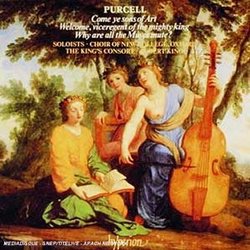| All Artists: Henry Purcell, Robert King, James Bowman, Michael Chance, King's Consort, Gillian Fisher, Tessa Bonner, John Mark Ainsley, Mark Padmore Title: Purcell: Complete Odes and Welcome Songs Volume 8 - Come ye sons of Art; Welcome, viceregent of the mighty king; Why are all the Muses mute? Members Wishing: 2 Total Copies: 0 Label: Hyperion UK Release Date: 11/23/1993 Album Type: Import Genre: Classical Styles: Opera & Classical Vocal, Historical Periods, Baroque (c.1600-1750) Number of Discs: 1 SwapaCD Credits: 1 UPC: 034571165981 |
Search - Henry Purcell, Robert King, James Bowman :: Purcell: Complete Odes and Welcome Songs Volume 8 - Come ye sons of Art; Welcome, viceregent of the mighty king; Why are all the Muses mute?
CD Details |
CD ReviewsA voice teacher and early music fan George Peabody | Planet Earth | 03/08/2006 (5 out of 5 stars) "SMALL BUT MIGHTY GROUP OF EIGHT SING THREE OPULENT ODES! All but the largest of Purcell's Odes (notably "Come Ye Sons of Art" and "Hail,Bright Cecelia") seem to have been intended for performance by up to a dozen instrumentalists and a double quartet of singers, who between them covered all the solos and joined forces for the choruses. I believe ,therefore, that the ensemble recorded here closely matches the number of performers that took part in seventeenth-century performances. For his 1694 offering to Queen Mary "Come ye Sons of Art, away",Purcell was in 'sparkling' form producing an expressive and expansive composition. The text was inspired (probably by Nahum Tate) and full of references to music and musical instruments which gave Purcell's imagination plenty of source material. The ode "Welcome, vicergent of the mighty King" was written for the return of King Charles II to London. The chorus writing is spritely and full of life,the solo vocal writing sensitive and imaginative and the string writing expecially fine. "Why are all the Muses mute?" was the first Welcome Song that Purcell wrote for King James II. The opening of this ode is unique as, at first glance, there appears to be no overture, but Purcell pictorializes: "Why are all the muses mute? Why sleeps the viol and the lute? Why hangs untuned the idle lyre?" leads him to begin magically with a lone solo tenor who manages to wake the chorus and then finally the orchestra. In mentioning the participants, an important singer was not singled out and in my opinion he is the better countertenor all in all. In fact Robert King has chosen him as the first voice to begin his odes. Michael Chance began the singing with "Come, come ye sons of art"; his voice is fresh and new and fortunately takes us away from the "foghorn" quality of earlier British countertenors such as Deller and Bowman. Some listeners may prefer this sound, but I don't. This recording is truly a gem for Purcell lovers and Mark Padmore is another of its shining lights.!" A glorious finale to a wonderful series of Purcell songs George Peabody | 03/10/1999 (5 out of 5 stars) "This disc is just one volume from Robert King's monumental anthology of Purcell's music - 19 volumes of songs, odes, services and anthems; plus additional discs featuring solo songs and duets. I confess, I myself don't own all of them. But on the basis of the ones I do own I can safely assert that Mr. King is one of the best interpreters of Purcell's music; and that his musicians and soloists turn in performances which are unlikely to be soon bettered. Many of the performers make repeated appearances throughout the series, helping King to knit together a consistent and homogeneous presentation of some of the best baroque music in the world. The extraordinary James Bowman is present in virtually every volume. So are such well-known English baroque performers as Gillian Fisher and Michael George. Frequently encountered are Rogers Covey-Crump and Charles Daniels, both of The Hilliard fame. Some of the less frequent participants, however, are not to be slighted. Mark Padmore appears in a couple of pieces here and there, but leaves an indelible imprint on the entire series by singing the glorious finale "O how blest is the isle" which is featured on this disc, since it is the last of the "Odes and Welcome Songs" volumes. This volume is my favorite, but there are so many other Purcell recordings that are worthy of a baroque lover's attention! Some of my other favorite Purcell recordings, in addition to this one, include: Hail! Bright Cecilia (Herreweghe); King Arthur (Christie); and Fairy Queen (Christie, Christophers or Norrington)."
|


 Track Listings (24) - Disc #1
Track Listings (24) - Disc #1